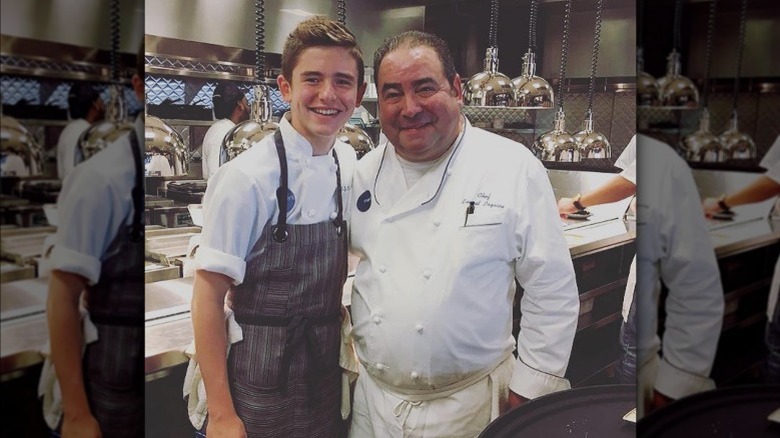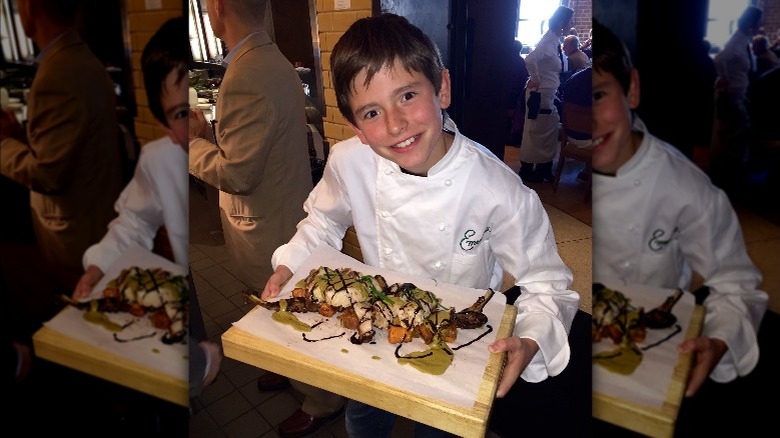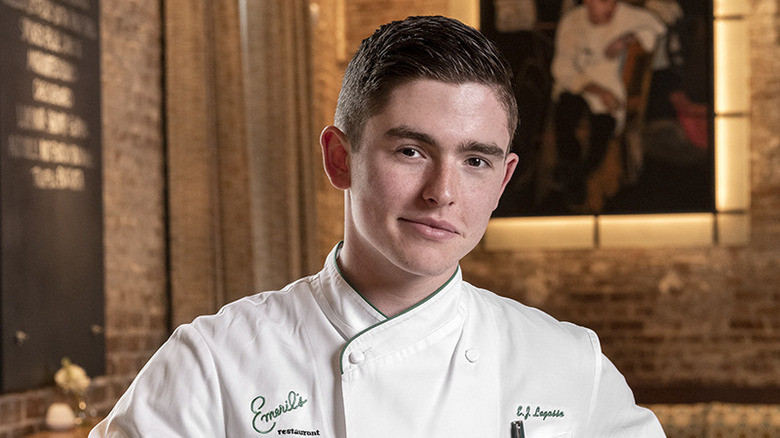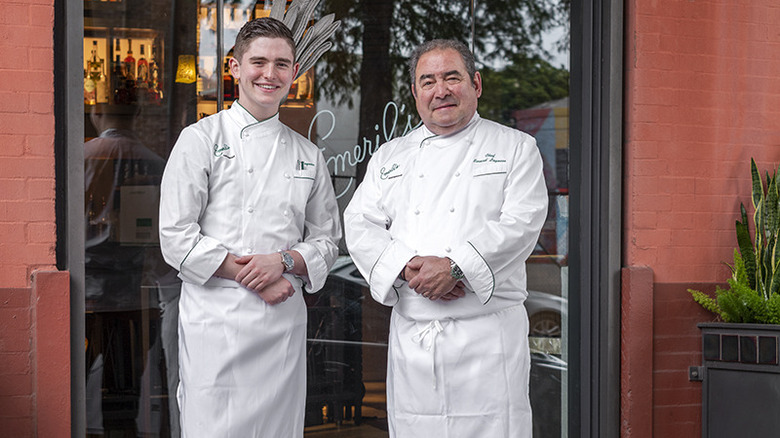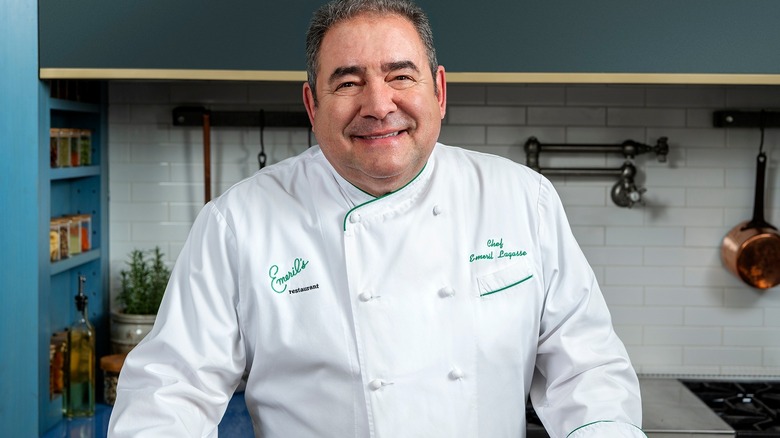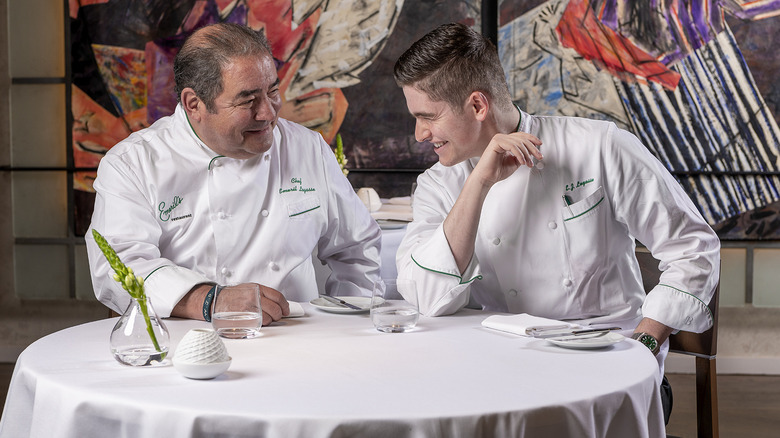Emeril And EJ Lagasse On Their Culinary Legacy As Father And Son - Shared Tastes
This interview was recorded prior to the beginning of the 2023 SAG-AFTRA Strike.
There are few names in the culinary lexicon that evoke as much familiar renown as Emeril Lagasse. He's arguably one of the most famous faces on food television, and his comforting yet exuberant presence has graced TVs across America for decades. At his core, though, Lagasse is a chef, and his heart resides in a restaurant kitchen. His first restaurant, Emeril's New Orleans, opened in 1990, and since then, Lagasse has built a lineup of eateries and helped to elevate and popularize modern Cajun cuisine. He's also authored 18 cookbooks, launched cookware lines, and more. The man is a legend of the food world, and he's not slowing down anytime soon.
However, the Lagasse legacy doesn't end with Emeril. He's passed on his passion for food, his cooking skills, and even his flagship restaurant to his 20-year-old son. EJ Lagasse, as he's known, grew up in the kitchen beside his father and developed his own love of cooking early on. As his passion developed, his father sent him around the world to develop his skills with some of the best in the business. Now, EJ's come full circle, taking the helm of his dad's flagship restaurant earlier this year, ahead of its first major renovation in 33 years.
In the most recent episode of Tasting Table's "Shared Tastes," the dynamic father and son duo came together to discuss their mutual love of making food, looked back on how Emeril influenced EJ's own culinary path, and reveled in how that journey has brought them both back home for the renaissance of the restaurant that started it all.
EJ Lagasse shares his first memory of cooking with his dad
Emeril Lagasse: Hi, I'm Emeril Lagasse –
EJ Lagasse: The culinary icon that is my dad, and I am EJ Lagasse, and I am here –
Emeril: At our restaurant Emeril's in New Orleans. So EJ, do you remember your first memories of cooking?
EJ: Yeah, I really do. Growing up in New York and being there, I remember you coming home from filming "Emeril Live" or "Essence of Emeril," and I remember very fondly making chicken noodle soup very early on, and peeling carrots. I think there's family pictures of that. That's probably one of the earliest cooking memories that I have, [along with] eating and tasting everything under the sun that you would make when you were home, and cooking and then eating out a lot. I very fondly remember very early dinners and things like that were definitely instrumental in me becoming a chef.
Emeril: It's amazing to me that what we have in common is ... My first inspiration was with my mom, Hilda, making a soup, and it seems like your first inspiration was also making chicken noodle soup together, you and I.
EJ: Yeah, that's funny to think about it like that.
Emeril: Probably about the same age.
EJ: Probably, and I think it comes down to the fact that you're not going to give a 4-year-old a knife to cut some carrots with. The peeling was about as good as I could get at that point.
Emeril: Do you have memories of dishes that I've cooked for you at home?
EJ: Yeah, one that always circles back is when we would go to Mikey's to get fish on First Ave. You would always grab salmon and you would do Lentils du Puy with cumin and carrots and the whole deal, with either green beans or something on the side. That was one of those early at-home dishes that I remember you doing: roasted salmon and lentil, which I, to this day, will, every other month, have a craving for that exact dish and have to go and get salmon and have to go get lentils and make salmon and lentils at home. That's a very early one.
Emeril: Yeah, we're still doing it.
EJ: You never did the restaurant dishes at home, because you knew that we were eating them when we would come and eat at Emeril's Steakhouse or wherever we would be. I can never remember you making barbecue shrimp or something like that at home unless we were having people over to the house. You were never on a random Sunday like, "We're going to do barbecue shrimp tonight." You were trying to be a bit more out of the box. You were trying to do your own whatever you wanted to cook at the time.
Emeril: Yeah, for sure, more homestyle dishes.
EJ: A lot of Portuguese food.
Emeril and EJ on following in his father's legendary footsteps
Emeril: I have good memories of when you first said that you were going to be a chef, or that you wanted to be a chef. Can you tell us about that and where it was and about how old? You grew up in the kitchen and were alongside me all the time, either being in the dining room and talking to guests, or being in the kitchen and wanting to help. When was it that you really just kind of put it together?
EJ: Well, I think I said it to you very early on, but it was so early that I don't think any responsible parent could take that seriously. I remember saying it to you after dinner at Cafe Boulud in the car on the way home when we had the duck thing when Gavin ... when Chef Kaysen was the chef at Cafe Boulud. We've spoken about that before, but I remember that being the first time that I said to you, "This is something that I could actually do. I would like to do this."
You gave it the old, "Yeah, sounds great, man." I'm like 8 years old, so how do you take that at any part seriously? It was just a few years later that we were in the kitchen at Emeril's, and I told you one night after dinner service that I was like, "Hey, this is really what I want to do." And the first thing you said is, "Well, you're not going to work for me. You're going to go work for other people." Anyway, it was the best advice that I could give anybody.
Emeril: Do you think that was great advice that I gave you? Out of the nest?
EJ: Yeah, because I don't think there's any growing in a place [where] you're comfortable already. I was naturally comfortable at Emeril's because I had been in there since I was so small. It never felt uncomfortable. Cooking at Emeril's never felt uncomfortable. I don't know if it was from a sense of ... I don't know if there was any issues. I wasn't going to get in trouble cooking or anything like that. The best advice that you gave was, "Yeah, okay, sounds great, but there is no chance you're just going to cook at Emeril's for 10 years and then become the chef," basically. You knew that wasn't the way to do it.
EJ' culinary influences go beyond his father, and that's by design
Emeril: What was that journey after you left Emeril's, involved with me opening Coastal? Which is a challenge because I remember after school every day, you'd be in the restaurant, a full-fledged member.
EJ: I got in trouble at school because I kept trying to leave school early. You remember that. They were calling you, "Where's EJ?" I'd leave and I'd be at the restaurant all the time. That was because I loved it so much and I saw that you were putting in so much to opening this new restaurant and trying to get something going, and that made me care a lot about the restaurant, which was fun.
It all started, for me, progressing when eating at Le Bernardin or going and having a family dinner around Thanksgiving or Christmas at Le Bernardin for a long time, when I was a child. I had met Chef Ripert many times at the restaurant. We did Cayman Cookout together [some time during 2013-2015].
That's when you said to Chef Ripert, "Hey, he's really wanting to become a chef." I remember you said something that was a joke and Chef Daniel was sitting next to you. Chef Daniel started laughing because you were like, "Yeah, he wants to be a chef, but I don't think he wants to do my style of stuff. I think he wants to do whatever you guys are doing." We were joking about that, and that was the year that Chef Jose bought Chef Ripert the three Michelin star swim trunks ... and then everybody was giving him hell about the swim trunks.
There was an ongoing joke about that. Chef Ripert and Chef Daniel both invited me to their restaurants. You know what happened over the next three years, and working in both of those restaurants for a bit of time set a very humbling precedent for the amount of work that was going to be ahead of actually trying to become a chef –not just become a chef and, "Okay, now I cook," or, "Okay, I went to Johnson & Wales, so now I am a chef" — in a sense of genuinely understanding what it takes to operate at a high level.
Emeril: You were like 15, 16, and you went back to New York City.
EJ: Yeah.
Emeril: You were there for months, living back in New York City pretty much on your own at 16.
EJ: It was probably two years, collectively together, all the different trips. What do you think was your reactions to all of those different stages that you were able to witness not only as a father but as a chef in that regard?
Emeril: It was really well-rounded, your training. You got the classics and the education at Johnson & Wales. You really evolved tremendously at La Bernardin. You understood discipline at Daniel. You saw a different form of creativity at Core with Claire and with Chef Johnny as well as Fransen, as well as Enrique in Lisbon. Then, it was time to say, "Okay, it's time to come home."
The revamping of Emeril's New Orleans is a full circle moment for father and son
Emeril: You came back and moved to New Orleans and entered Emeril's and became the chef patron. How was that experience? How was that evolving for you? Now, I see a lot of evolution at the restaurant. We have three services left before we close for 33 years, a full-on renovation, which you have spearheaded. How does that feel for you?
EJ: It's remarkable.
Emeril: It's enlightening for me to see a lot of things that I have been dreaming about doing for years. It's great for me to see it coming to fruition.
EJ: When I was younger and you described some of those ambitions that you had for the restaurant to me, that certainly helped me understand what the next steps in your mind were for Emeril's. I didn't think we would be at the point where we were renovating fully, to move into that anytime soon. It's really cool because I feel in touch with 27-year-old Emeril gearing up to open your first restaurant. I feel like we're reopening Emeril's. That's what it feels like. That's a really cool experience for me, because we've always been very close from a personal standpoint, and personal life and things have nothing to do with food. Now, we're becoming very close in a sense of understanding of the business. I'm understanding you in a very different age.
I'm understanding some of the hardships that you might've went through. It gives me a different sense of empathy and understanding of your thought process now. Everything you've warned me about going into this renovation, it's been spot on. There is no advice that hasn't come to fruition. "Be careful doing this, be careful doing that," or, "That sounds great. That sounds great." They've worked and they've happened.
You have that very special perspective, because you are having March 26th, 1990 all over again in the fall this year, whereas it may be my first real [time to] have the doors open and have a shot at it, in the way you wanted to set up. When you opened in 1990, you had built that restaurant to do exactly what you wanted it to do. It was how you wanted it to be. It was avant garde at the time. It was an expression of yourself. It was art coming from you, from your inner being. I definitely am trying to channel that, and I've been successful in channeling that emotional connection to the opening.
What does it feel like for you, seeing the restaurant reopen? Am I correct in saying that it feels like March 26th, 1990, all over again?
Emeril: Yeah, but in a much grander scale of dreams and things that I've thought about for many years, now we're really getting ready to happen. I can't go into a lot of detail right now. All I can say to folks out there is that you'll have to come and see what we're doing.
EJ: You're always up for a little plug tease, man. You're so good at those.
Emeril: No, I'm being really sincere. We have three services left and then we're going to close for a bit of time to do a full-on renovation. Hopefully, successfully, we reopen and successfully make it another 33 years.
EJ: Cheers to that. We were looking at some of those construction documents and I was like, "Yeah, we're going to have to take this wall out. It's been here for [35] years." It was here six years before you opened the restaurant, and your comment was, "Oh man, who knows what's going to be behind that wall?" That's hilarious to me because you have 34 years of memories in this building, and 34 years of stories. We always say, if these walls could talk, you'd be able to write a series of books. It's funny, taking a sledgehammer to a wall that's been there for 35 years. There's something a bit Spidey-sense-tingling about that. I'm very excited, but it's like, "Ooh, here we go." This is the next stage of this.
Emeril: Absolutely.
Looking back on Emeril's legendary TV career
EJ: So, Dad, as we've been ... Last night, we were talking about it, and obviously as you said, we won't go into detail, but there's some nods in the renovation that pay some homage, if you will, to some of your classic moments on television, because it's a part of culinary history that isn't related to the restaurants, but is so significant for the restaurant. You had no dream of television when you opened the restaurant.
Emeril: No, I opened the restaurant and then I opened NOLA, our second restaurant in the French Quarter, only because I was preventing, or trying to prevent, the revolving door from happening and wanting to keep people that I happened to respect and like and that were hardworking. Then this television thing came, and like [we] said, I had no idea that I would ever do television. I knew that I would do a morning appearance here or an appearance here or whatever, but to full-on do television from "Essence of Emeril," to 12 seasons, to "Emeril Live" ... The only reason that I took the challenge on was because honestly, I really wanted to teach people more about food and to respect food, shopping, wine, spirits, et cetera. I could do that and take the intimidation factor out of it and get people excited to want to cook and to want to try things, whether it was a pot roast or a hamburger.
Then, the whole musical thing happened with "Emeril Live," because [of] our musical background. It was a hoot for me to have musical artists come on that were interested about food in some way or another. It was an interesting ride, to say the least, a very proud one. To think back now that I took a network from zero to a 100 million viewers around the world was pretty spectacular.
EJ: Over 2,000 shows, man.
Emeril: As you know, especially how close you and I are, at the end of the day, I'm a chef. I'm a restaurateur, and the same results matter. It's about making people happy through food, through wine, through service, through having an experience.
EJ: You have this very interesting connection with people. I see it when people come up to you and say hi. They feel like they almost know you. That's because of how intimate the idea of a primetime television show in a living room is.
Emeril: Yeah.
EJ: You were able to make that difference for people and take that intimidation out of food, much like when you're trying to operate on a high level in a restaurant, like you were back in the day, or like we are now. You're trying to take the intimidation out of it for your team and build confidence in your team. There's definitely a parallel there. You could view food television as a wing of hospitality. I certainly do. You certainly could. It's a very important moment, and there's no shying away from that. You did so many episodes, so many hours, worked so hard, four or five shows a day.
I'm the same as you. I'm a chef, and it'll be that way, hopefully, till the end of time for me. If television for me comes out of the same thing of wanting to teach people, allow people to see a glimpse in the world which we work in ... What you accomplish is not ... Nobody's going to do that again.
I know you would never say that about yourself, but I'll say that. The way that you took elements of Jay Leno and stuff and had a live band, it was like the coolest late-night talk show ever. It was a late-night talk show with flambéed and brûléed bananas. I mean, how cool?
Emeril: Yeah, exactly.
EJ: It's cool, man. It's cool.
Emeril: Now, having the ability to do these shows on Roku now, it's a lot of fun, creating and sort of directing myself into today's time. It's a hoot to see that evolve.
EJ: Yeah.
What's next for the Lagasse culinary legacy
Emeril: I think you know where "Bam!" came from. I think you've heard the story enough times to know how that came about. It was waking everybody up in the studio.
EJ: We're doing five shows a day. You have to.
Emeril: Yeah, eight shows a day then, being a food show and eating all the food.
EJ: Were they always an hour? They were always an hour, right?
Emeril: Well, those were half hours shows.
EJ: Half hours.
Emeril: "Emeril Live" was an hour show, but that's where the whole "Bam" thing came from. Do you think you're going to have a catchphrase as well? Maybe like, "Ka-pow"?
EJ: I'll leave the catchphrase to you, man. I don't know if I could top "Bam." I don't think I could ... I hear that three times a day. [including when I] go to the grocery store. I'm like, "I'm not even the guy." Props to you for that one. It's at the point where if I said, "Bam," I'd have to pay you for it. It's gotten to that level. I don't think there's any topping that for me. We'll see. I don't plan on it, but yeah, you aced it with that one.
Emeril: TBD.
EJ: TBD maybe. Yeah, we'll see.
Emeril: I'm not retiring anytime soon, so we've got some cool things happening on the drawing board. We have the renovation at Emeril's, and we're working on a project, EJ and I, called 34, myself being the third, and he being the fourth, which is going to be a Portuguese Spanish inspired restaurant. We have another restaurant on the drawing board here in New Orleans. We got a lot of exciting things coming up. The one thing, doing this for a while now, is that, you know that you're on the road, but I've been on the road for a long time that I've never seen the end of the road yet. I'm hoping to keep driving on that road and never see the end.
EJ: That's a nice way to put it. That's a great way to put it. The renovation at Emeril's is so substantial, even from an architectural standpoint.
Emeril: Just from a kitchen standpoint.
EJ: From a build-out standpoint, it is so substantial. I'm really excited about that. We're going to be pedal-to-the-metal when we get back to reopening. The reason you have great teams is so that you're able to work on other projects at the same time.
You know where my focus is going to be for the next few months. Certainly that's next here, trying to cultivate a representation of not only your legacy, but the legacy of culinary arts in Louisiana, and cultivate a representation of that through the food and through the people in the building and through the story that the food tells. That's the goal here. I'm not telling you anything you don't know, but that's next for us and we'll see what happens after that.
Emeril: What's next for us is I'll see you in about an hour for service.
EJ: Yeah, I got to go iron my coat.
Emeril's New Orleans is currently closed. Stay tuned for a fall renovation reveal of the NOLA Flagship restaurant, with EJ Lagasse at the helm.
